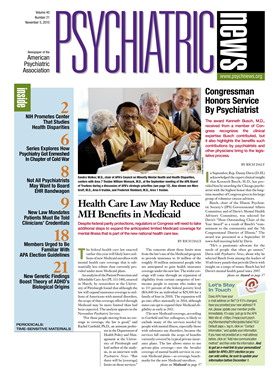APA and groups representing psychiatric educators, along with other medical specialty societies, are saying “no” to proposals to have the federal government monitor resident duty hours.
In a letter last month to David Michaels, Ph.D., M.P.H., assistant secretary of the Occupational Safety and Health Administration (OSHA), APA President Carol Bernstein, M.D., and leaders of six other groups representing academic psychiatry insisted that oversight of compliance with resident work hours should remain with the Accreditation Council for Graduate Medical Education (ACGME) and that petitions to have OSHA assume oversight should be rejected.
“The issue of house officer work hours is inseparable from issues of patient care quality and education,” Bernstein and the six other leaders wrote. “Duty hours cannot be considered in a vacuum. A proper balance must be struck in the curriculum between teaching high-quality care and providing a safe working environment for house staff. The ACGME, with oversight of the whole curriculum, is best able to ensure this balance.”
The six other groups were the American Association of Directors of Psychiatric Residency Training (AADPRT), the Association for Academic Psychiatry, the Association of Directors of Medical Student Education in Psychiatry, the American Academy of Child and Adolescent Psychiatry, the American Association of Chairs of Departments of Psychiatry, and the Society of Professors of Child and Adolescent Psychiatry.
Bernstein and the co-signers said that the ACGME has a long track record of monitoring institutional compliance with resident duty hours and other educational requirements, and that the ACGME has already submitted new rules regarding work hours that are to go into effect July 2011. Those new rules were issued in September (see
Residents, Training Directors Get New Duty-Hour Rules).
The group writing to Michaels noted that the ACGME promulgated new duty-hour regulations in 2003 that limited night call frequency and hours of continuous duty and required a minimum number of hours off between shifts and days off per week.
“In response to these regulatory changes, hours worked by U.S. house officers fell precipitously,” they said, citing the study “Trends in the Work Hours of Physicians in the United States,” which appeared in the February Journal of the American Medical Association.
That study found that resident work hours fell by 9.8 percent between 1996 and 2008, declining markedly after 2003 when new duty-hour restrictions went into effect. “These changes have already improved resident well-being, patient safety, and amount of supervision available to house staff,” Bernstein and the other authors wrote.
They also noted that the Institute of Medicine stated in its 2009 report that the ACGME was best suited to monitor and regulate institutional compliance with duty-hour regulations. They added that “at a time of significant budget deficit, it would be fiscally irresponsible to create a new regulatory agency” within OSHA for monitoring duty hours.
Outsight Oversight Said to Be Necessary
What aroused the educators was a lengthy petition to OSHA seeking the agency's oversight of work hours. It was submitted on September 2 by the consumer advocacy group Public Citizen, the Committee of Interns and Residents (a division of the union SEIU-Healthcare), and the American Medical Student Association.
The 43-page petition cited evidence showing that residents work in excess of allowable limits and that excessive work and lack of sleep pose substantial risks to resident health through increased risk for automobile accidents, depression, pregnancy complications, and percutaneous injuries. The petition also cites the success of federal regulation of work hours in the aviation, railroad, trucking, and other industries. The three groups say the 2011 ACGME rules regarding work hours fall short of protecting patients and residents.
A similar petition filed by Public Citizen in 2001 was rejected by OSHA.
In a press release announcing the new ACGME rules on work hours, the commission noted that it was developing a process called “Institutional Patient Safety and Quality Assurance” review. Its purpose is to begin to ensure compliance with these new standards—a move that would appear to be designed to head off complaints that it is not sufficiently policing duty hours.
“Under this program, the ACGME will review every institution sponsoring graduate medical education programs, examining their ability to integrate residency education, supervision, and fatigue management into their existing patient safety and quality improvement initiatives,” the Commission stated.
Medicine Not Like Other Industries
Speaking in support of t he new ACGME duty-hour proposal, Sheldon Benjamin, M.D., president of AADPRT, told Psychiatric News it is becoming increasingly clear that if organized medicine does not regulate resident work hours, then the government or an outside agency will.
“AADPRT and other psychiatric organizations feel strongly that the issue of resident duty hours cannot be considered separately from the issues of patient care and education, and that an independent government agency should not regulate resident work hours for this reason,” he said.
Citing the arguments in the petition submitted by Public Citizen and the resident and medical student groups, Benjamin said evidence from the trucking and aviation industries was of questionable validity with regard to the training of doctors. “One can't really generalize from airline pilots and truck drivers to physicians,” he said.
